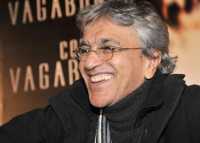Caetano Emanuel Viana Teles Veloso ( born August 7, 1942), better known as Caetano Veloso, is a Brazilian composer, singer, guitarist, writer, and political activist.
Veloso first became known for his participation in the Brazilian musical movement Tropicalismo which encompassed theatre, poetry and music in the 1960s, at the beginning of the Brazilian military dictatorship. He has remained a constant creative influence and best-selling performing artist and composer ever since.
Veloso was born in the city of Santo Amaro da Purificação, in Bahia, a state in the northeastern area of Brazil, but moved to Salvador, the state capital, as a college student in the mid-1960s. Soon after the move, Veloso won a music contest and was signed to his first label. He became one of the founders of Tropicalismo with a group of several other musicians and artists—including his sister Maria Bethânia—in the same period.
However the Brazilian government at the time viewed Veloso's music and political action as threatening, and he was arrested, along with fellow musician Gilberto Gil, in 1969. The two eventually were exiled from Brazil, and went to London, where they lived for two years. After he moved back to his home country, in 1972, Veloso once again began recording and performing, becoming popular outside of Brazil in the 1980s and 1990s.
Veloso's work upon his return in 1972 was often characterized by frequent merging not only of international styles but of Brazilian folkloric styles and rhythms as well. His popularity grew outside Brazil in the 1980s, especially in Israel, Greece, Portugal, France, and Africa. His records released in the United States, such as O Estrangeiro, helped gain him a larger audience.
To celebrate 25 years of Tropicalismo, Veloso and Gilberto Gil released a CD called Tropicalia 2 in 1993. One song, "Haiti", attracted people's attention during the time, especially because it included powerful statements about sociopolitical issues present in Haiti and also in Brazil. Issues addressed in the song included ethnicity, poverty, homelessness, and capital corruption in the AIDS pandemic.
By 2004, he was one of the most respected and prolific international pop stars, with more than 50 recordings available including songs in film soundtracks of Michelangelo Antonioni's Eros, Pedro Almodóvar's Hable con ella, and Frida, for which he performed at the 75th Academy Awards but did not win. In 2002 Veloso published an account of his early years and the Tropicalismo movement, Tropical Truth: A Story of Music and Revolution in Brazil.
His first all-English CD was A Foreign Sound (2004), which covers Nirvana's "Come as You Are" and compositions from the Great American Songbook such as "The Carioca" (music by Vincent Youmans and lyrics by Edward Eliscu and Gus Kahn), "Always" (music and lyrics by Irving Berlin), "Manhattan" (music by Richard Rodgers and lyrics by Lorenz Hart), "Love for Sale" (music and lyrics by Cole Porter), and "Something Good" (music and lyrics by Richard Rodgers). Five of the six songs on his third eponymous album, released in 1971, were also in English.
Veloso has contributed songs to two AIDS benefit compilation albums produced by the Red Hot Organization: Red Hot + Rio (1996) and Onda Sonora: Red Hot + Lisbon (1998).
In 2011, he again contributed two songs to the Red Hot Organization's most recent compilation album, "Red Hot + Rio 2." The two tracks include Terra (Prefuse 73 '3 Mellotrons In A Quiet Room' Version) and Dreamworld: Marco de Canaveses, in collaboration with David Byrne.
His September 2006 album, Cê, was released by Nonesuch Records in the United States. It won two Latin Grammy Awards, one for best singer-songwriter and one for Best Portuguese Song, "Não Me Arrependo". With a total of five Latin Grammys, Veloso has received more than any other Brazilian performer.
Veloso has been called "one of the greatest songwriters of the century" and "a pop musician/poet/filmmaker/political activist whose stature in the pantheon of international pop musicians is on a par with that of Bob Dylan, Bob Marley, and Lennon/McCartney".
